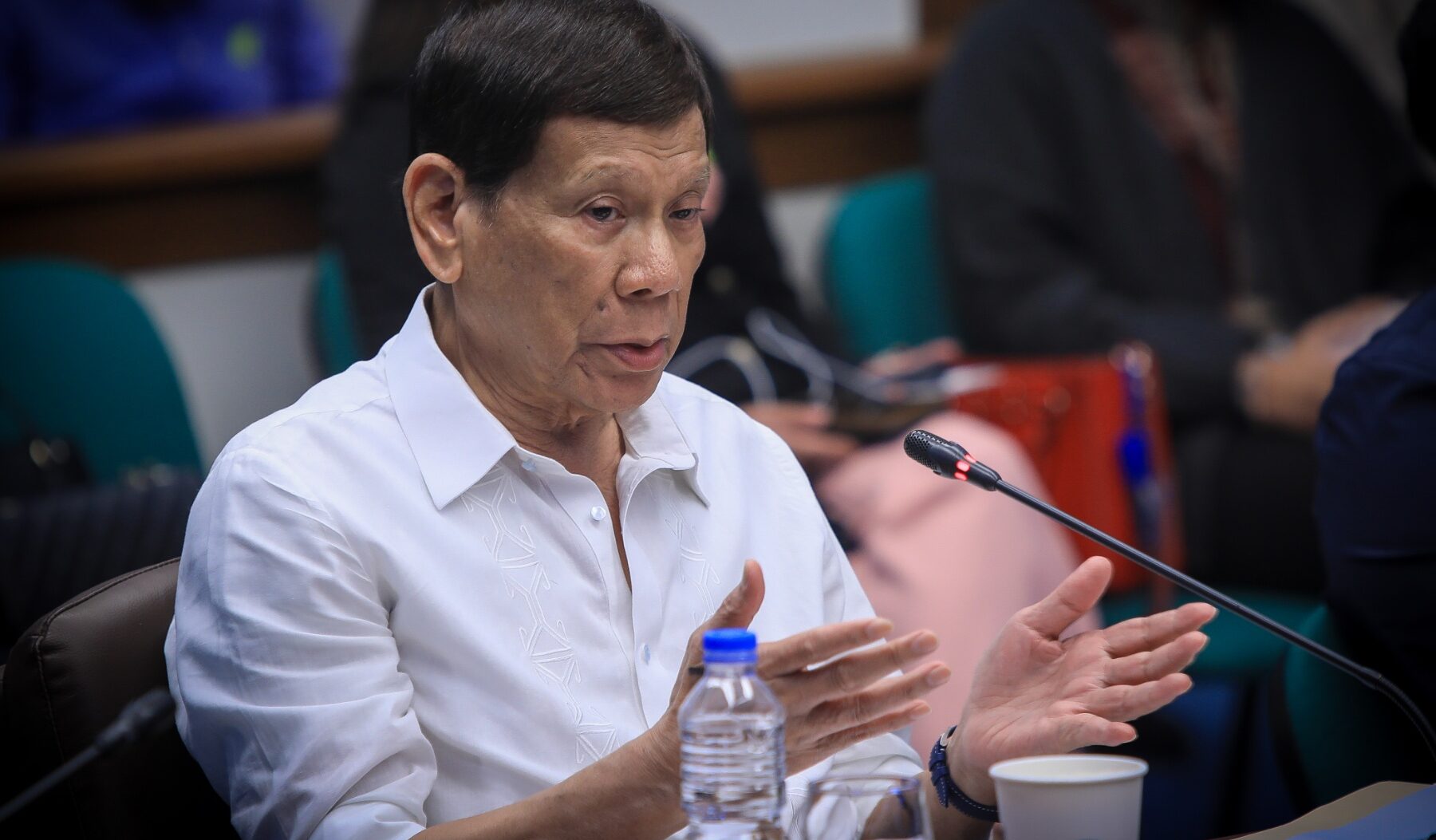
Former President Rodrigo Roa Duterte at the Senate panel probe into his administration’s war on drugs last October 28, 2024. (Senate Public Relations and Information Bureau)
MANILA, Philippines — Former President Rodrigo Duterte will not attend the House of Representatives quad committee’s November 7 probe into his administration’s bloody war on drugs, according to his lawyer.
In a letter sent to the office of Surigao del Norte 2nd District Rep. Robert Ace Barbers, Atty. Martin Delgra III revealed that he received the mega panel’s invitation on behalf of his client last November 2.
Upon consultation with his client, Delgra said Duterte opted to skip the probe, expressing doubt about the integrity of the quad comm and “to save the government time and taxpayer’s money” since he already attended a recent Senate hearing probing a similar matter, among others.
Although Duterte “respects and recognizes the authority of the Honorable Committees to conduct inquiries, in aid of legislation,” Delgra revealed that his client “is already doubtful” of the mega panel’s integrity, as well as “independence, and probity.”
“While my client’s attendance is supposedly for him to provide valuable insights and to shed light on issues under discussion particularly on extra-judicial killings, it is apparent that the inquiry is a mere political ploy aimed to indict him for crime or crimes he did not commit,” Delgra wrote in the letter released to the media on Wednesday.
He also cited Manila 6th District Rep. Bienvenido Abante Jr. and Santa Rosa City Rep. Dan Fernandez’s position that Duterte should be “held liable for the crime of willful killing under Section 6 of RepublicAct No. 9851 or the Philippine Act on Crimes Against International Humanitarian Law, Genocide and Other Crimes Against Humanity, even alleging that the facts are clear.”
“If that is indeed their belief, then the proper course of action would be for them to file the proper criminal cases against my client before the Department of Justice and for the latter to resolve whether probable cause exist or not. After all, we have a fully functioning judicial system in our country,” Delgra added.
Other reasons Delgra mentioned were the panel’s attempt “to persuade, if not unduly pressure, resource persons to admit matters under oath they lack knowledge of or worst, unduly induce them to say something not true before the joint committee inquiry.”
The lawyer also stressed that his client already appeared before the Senate Blue Ribbon Committee (subcommittee on the Philippine War on Illegal Drugs) last October 28.
“In the said hearing which lasted for almost nine hours, my client extensively discussed and shared his knowledge as to the alleged extrajudicially killings during his administration,” Delgra wrote.
“More importantly, he gave valuable inputs on how to strengthen the war on illegal drugs, a demonizing element and national menace,” he added.
Instead, Delgra said that the October 28 Senate hearing’s transcript should be sent to quad comm for their “appreciation and consideration.”
“In view of the foregoing, it is my client’s position that his presence before the Honorable Joint Committee in the public hearing set on November 7, 2024, at Quezon City, is no longer necessary,” he wrote.
During the Senate hearing last October 28, Duterte confessed that he assembled a seven-man hit squad when he was Davao City mayor.
The former chief executive also disclosed that he did not tap police officers as they might be in a quandary if they got suspended for operations they conducted.
Duterte also pointed out that the term “death squad” was loosely used, as he revealed that all former national police chief, now-Senator Ronald “Bato” Dela Rosa, retired police Lt. Gen. Vicente Danao, and retired Gen. Archie Gamboa, and retired Gen. Debold Sinas, led death squads.
Retired police colonel Royina Garma disclosed in a recent quad comm hearing that Duterte and other high-ranking officials during his administration sanctioned covert operations replicating the Davao City model of extrajudicial killings on a national scale.
Based on reports, Duterte’s war on drugs left at least 6,000 people dead.
Human rights watchdog Karapatan said that the former chief executive should be held accountable for the EJKs of 30,000 individuals involved with drugs, the alleged summary execution of 422 political activists, and the reported frustrated extrajudicial killing of 544 others.


